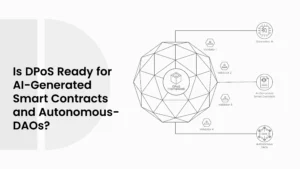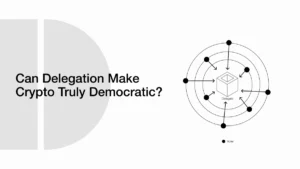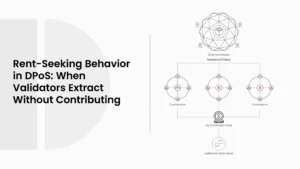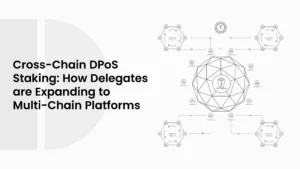Understanding DPoS Through Everyday Analogies
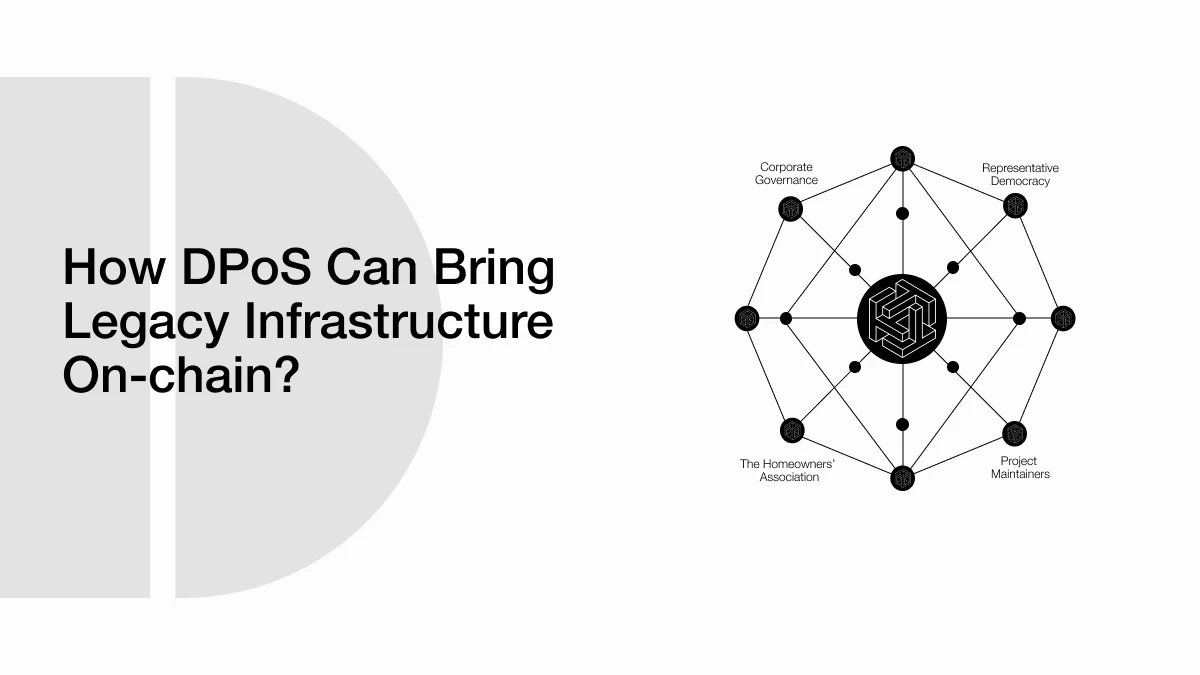
The basis of blockchain technology is the concept of decentralization. A network of people can control it, but not an individual. The blockchains involve a consensus system. Hence, there is an agreement among all people concerning which transactions are genuine.
- What Is DPoS? The Core Idea
- Relating DPoS to Real-World Systems
- 1. Corporate Governance: Blockchain as a Shareholder System
- 2. Representative Democracy: Blockchain as a Political System
- 3. The Homeowners’ Association: Local Governance at Work
- 4. Project Maintainers: How Open-Source Software Reflects DPoS
- DPoS Incentives: Performance Gets Rewarded
- Risks in the System: Where DPoS Can Stumble
- Centralization of Power
- Collusion and Influence
- Voter Apathy
- How Well DPoS Networks Respond
- Conclusion
- Frequently Asked Questions (FAQs)
- Glossary of Key Terms
The Delegated Proof of Stake (DPoS) is a rather popular and thriving consensus mechanism. A plethora of massive platforms, such as BitShares, TRON, and EOS, utilize it. It is known to be fast, power-efficient, and community-oriented.
DPoS can sound complicated, at least at first glance, especially to people who lack technical knowledge. Nevertheless, it works in the same way as many other systems do. Some of the underlying principles on which it is based include performance, accountability, voting, and trust.
What Is DPoS? The Core Idea
Most simply, Delegated Proof of Stake is a voting-centered consensus protocol. The users of a blockchain are not the ones that validate the transactions. Rather, individuals are going to vote to choose a small number of representatives who confirm transactions and produce new blocks.
This idea removes the randomness of Proof of Stake (PoS) as well as the intensive characteristic of Proof of Work. Rather than going to extremes to secure the network, only a handful of reliable people do verification, and the rest of the community keeps them in check by voting.
Relating DPoS to Real-World Systems
To understand this better, here’s what DPoS really is and how it connects with everyday systems you already know.
1. Corporate Governance: Blockchain as a Shareholder System
Consider a corporation that has thousands of shareholders. These shareholders do not have hands-on control of operations. They appoint a board of directors, and they are the decision makers. They steer the strategy and keep the company going. Whenever a member of the board is not working up to par, shareholders can choose to vote him out.
Similarly, DPoS operates by allowing token owners (the voters) to determine a small group of validators (similar to the board members) to operate the blockchain. These validators are responsible for verifying transactions and ensuring that the system runs smoothly. However, they do not always have power. In case they fail to do a good job, voters have the right to withdraw their approval and give it to another person.
Thus, in DPoS, the token owners hold power, akin to the owners of a company’s stock. The community does not enable validators to be in control. This makes the system more just, quick, and accountable.
2. Representative Democracy: Blockchain as a Political System
The comparison easily applies to politics. In a healthy democracy, voters do not vote on every subject. They elect delegates to serve on their behalf. These representatives are expected to be accountable, transparent, and in the best interests of the public, and they can be removed if they fail to perform.
DPoS functions in a similar manner. Rather than involving everyone in every decision, it appoints a small number of elected validators. This allows for faster decision-making while avoiding the turmoil of significant participation in each round of consensus.
3. The Homeowners’ Association: Local Governance at Work
Now consider a neighborhood managed by a homeowners’ association (HOA). Residents elect a board to handle common spaces, enforce rules, and maintain infrastructure. Not every resident is involved in every small decision, but they hold the board accountable and vote in new members if needed.
In DPoS, the community trusts delegates to handle daily operations while keeping the authority to revoke that trust when necessary. This mirrors the balance of trust and oversight that DPoS is designed to preserve.
4. Project Maintainers: How Open-Source Software Reflects DPoS
Open-source software projects often have a small group of maintainers who review changes, merge updates, and guide direction. These maintainers are selected based on merit and trust, but if the community disagrees with their decisions, it can fork the project and move in a different direction.
ALSO READ: Is DPoS Really Decentralized? A Deep Dive for Non-Techies
Delegates in DPoS play a similar role. They are authorized, entitled. Their authority is conditional on performance, and the community always has the final say.
DPoS Incentives: Performance Gets Rewarded
The fact that DPoS connects performance and rewards is one of the reasons why this system works. Delegates are rewarded by validating blocks, and most of them split the reward with the voters who elected them. This harmonizes incentives all around.
You can think of it like workplace bonuses. When a team leader meets or exceeds their goals, they often receive a bonus and gain more trust and support from the team. Similarly, in DPoS, validators who do a good job are rewarded and continue to receive votes. But if they don’t perform well, they can quickly lose support and be voted out.
Risks in the System: Where DPoS Can Stumble
No system is perfect. And DPoS, for all its efficiency and community control, comes with potential risks.
Centralization of Power
If a small number of large token holders dominate voting, they can keep the same delegates in power indefinitely. This is a real concern. Over time, the system risks losing the very decentralization it aims to protect.
Collusion and Influence
In the real world, we sometimes see powerful people or groups try to influence politicians through lobbying. They offer money, gifts, or other benefits to get special treatment or to push their own agendas. This can lead to unfair decisions that don’t help the general public.
Something similar can happen in a DPoS system. Wealthy token holders or groups might try to influence validators by offering large votes in exchange for special rewards or favors. Validators may also form secret alliances to vote for each other and stay in power.
Voter Apathy
The system requires active participation. However, where the voters become passive, a few people will end up deciding everything on behalf of the rest of the people. For instance, in the case of a low-turnout election, a vocal minority can dictate to the silent majority.
How Well DPoS Networks Respond
Well-designed DPoS systems implement tools to keep control balanced:
- Vote Decay: Votes lose strength over time if not renewed.
- Slashing Penalties: Delegates face consequences for bad behavior.
- Transparent Metrics: Voters can see which delegates are performing well and which aren’t.
- Reward Sharing: Voters are encouraged to participate, not just invest.
The goal is to keep the system active, transparent, and fair.
Conclusion
DPoS might sound technical, but its principles are deeply familiar. Electing trusted representatives, rewarding strong performance, and holding leaders accountable are ideas we apply in corporations, governments, local communities, and teams every day.
The concept of DPoS can be simplified through real-life examples, not only as a blockchain protocol but as a real-life governance system with three concepts of trust, participation, and transparency. Once done right, DPoS enables blockchain networks to scale and expand without compromising their essence of decentralization.
It’s not a system made only for developers or technical experts. It’s a structure built on how real communities work, where everyone’s voice matters and people are empowered to make change. DPoS mirrors what happens in society when authority is earned, accountability is expected, and the community stays engaged.
Frequently Asked Questions (FAQs)
1. What is Delegated Proof of Stake (DPoS)?
Delegated Proof of Stake is a blockchain consensus mechanism where token holders vote to elect a small group of delegates who are responsible for validating transactions and creating new blocks. Instead of everyone participating in the validation process, a few trusted representatives handle it on behalf of the community.
2. How is DPoS different from Proof of Work (PoW) and Proof of Stake (PoS)?
DPoS removes the randomness of PoS and the resource-intensive nature of PoW. In DPoS, a small group of elected validators manages the network efficiently. Unlike PoW, it doesn’t require massive computing power, and unlike PoS, it avoids giving direct validation rights to every stakeholder.
3. Why is DPoS considered energy-efficient and fast?
Because only a limited number of delegates validate transactions, the process is streamlined. This reduces the need for large-scale computational resources and allows blocks to be produced more quickly, making the system energy-efficient and scalable.
4. How does voting work in DPoS?
Token holders vote for validators (delegates). The more tokens you hold, the more weight your vote carries. You can change your vote at any time, and votes may even decay over time if not actively refreshed, depending on the network’s design.
5. Can DPoS systems become centralized?
Yes, there’s a risk of centralization if a few large token holders dominate the voting process, repeatedly electing the same delegates. This can lead to a concentration of power and reduce the system’s decentralization, one of blockchain’s core principles.
6. What real-world systems are similar to DPoS?
DPoS is similar to
-
Corporate boards, where shareholders elect a board of directors.
-
Representative democracies, where voters choose officials to act on their behalf.
-
Homeowners’ associations, where community members elect board members.
-
Open-source projects, where maintainers manage updates based on trust.
7. What incentives exist for voters and delegates in DPoS?
Delegates earn rewards for validating blocks. Many share these rewards with the voters who supported them, motivating both parties. Voters are incentivized to stay active and elect high-performing delegates to benefit from ongoing rewards.
Glossary of Key Terms
| Term | Definition |
|---|---|
| Delegated Proof of Stake (DPoS) | A consensus protocol where token holders vote for a limited number of trusted delegates who validate transactions. |
| Validator / Delegate | A person or node chosen by the community to validate transactions and create blocks in a DPoS system. |
| Consensus Mechanism | A method by which a blockchain network agrees on the validity of transactions and maintains security and trust. |
| Token Holder | An individual who owns digital tokens and is entitled to vote for delegates in a DPoS system. |
| Vote Decay | A mechanism where votes lose influence over time unless they are refreshed, encouraging ongoing participation. |
| Slashing | A penalty applied to delegates who misbehave or underperform, potentially losing their position or rewards. |
| Centralization | A condition where control becomes concentrated in the hands of a few, undermining the distributed nature of blockchain. |
| Fork | A split in a blockchain where the community creates an alternative version, often due to disagreement with current governance. |

